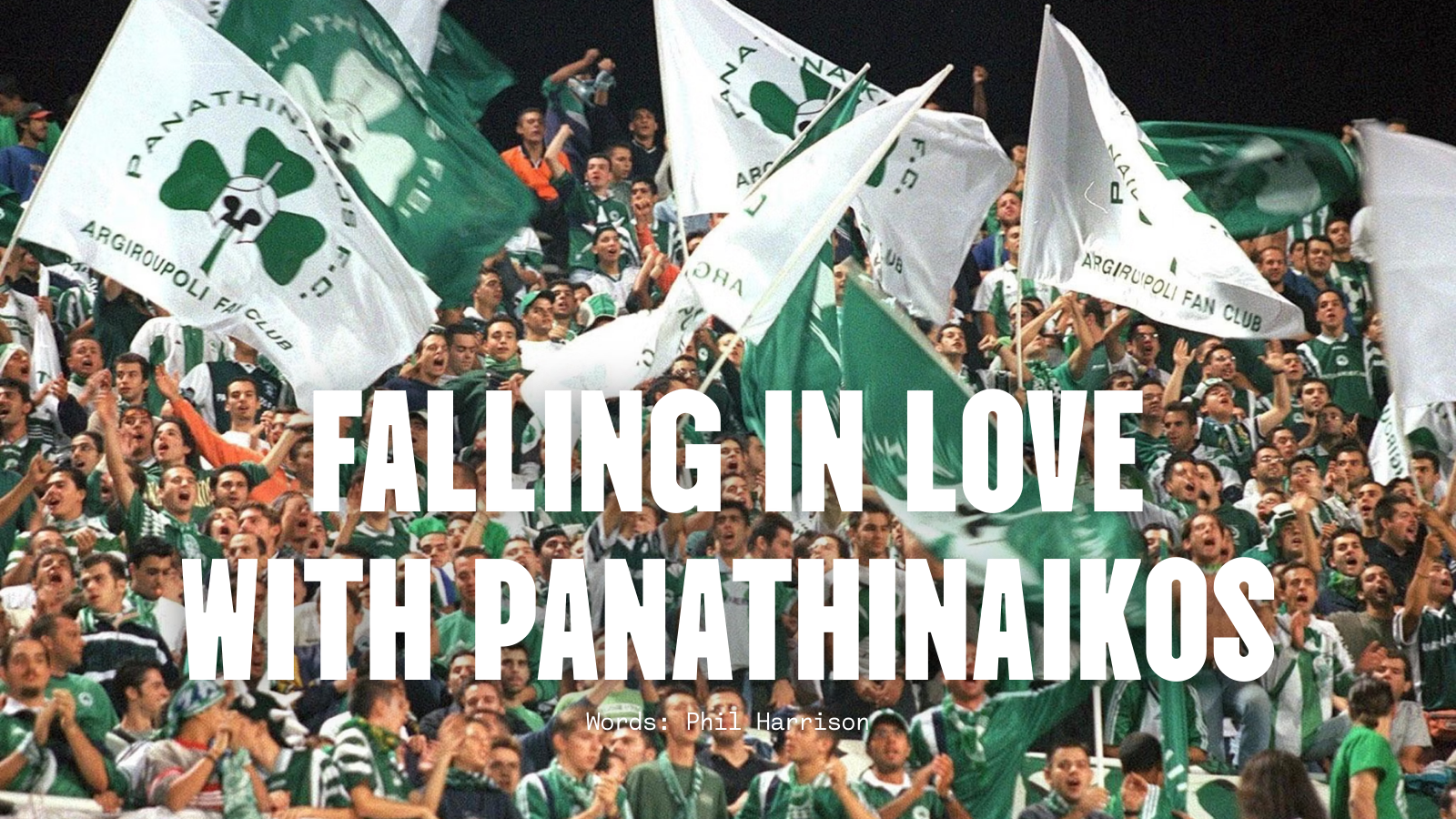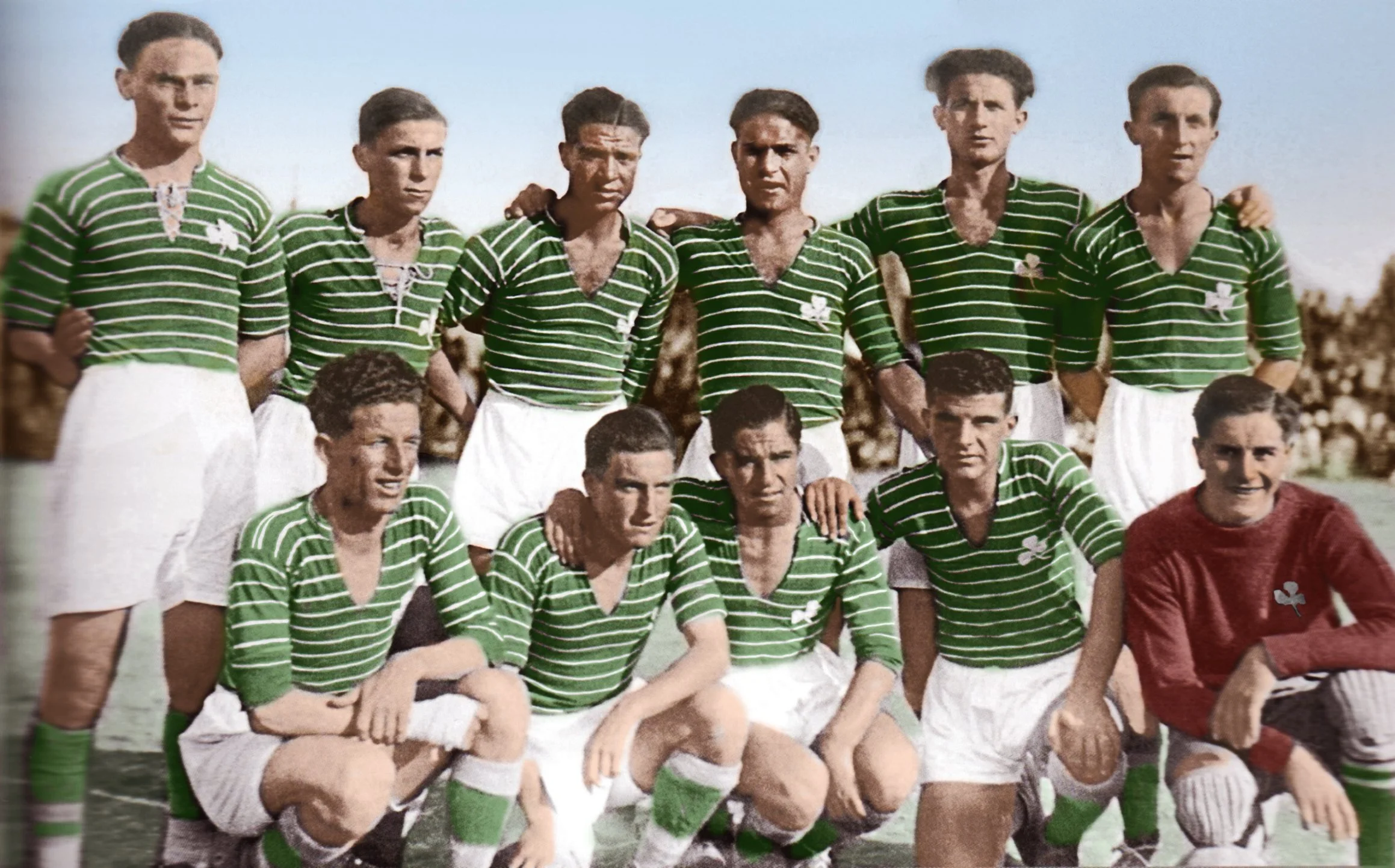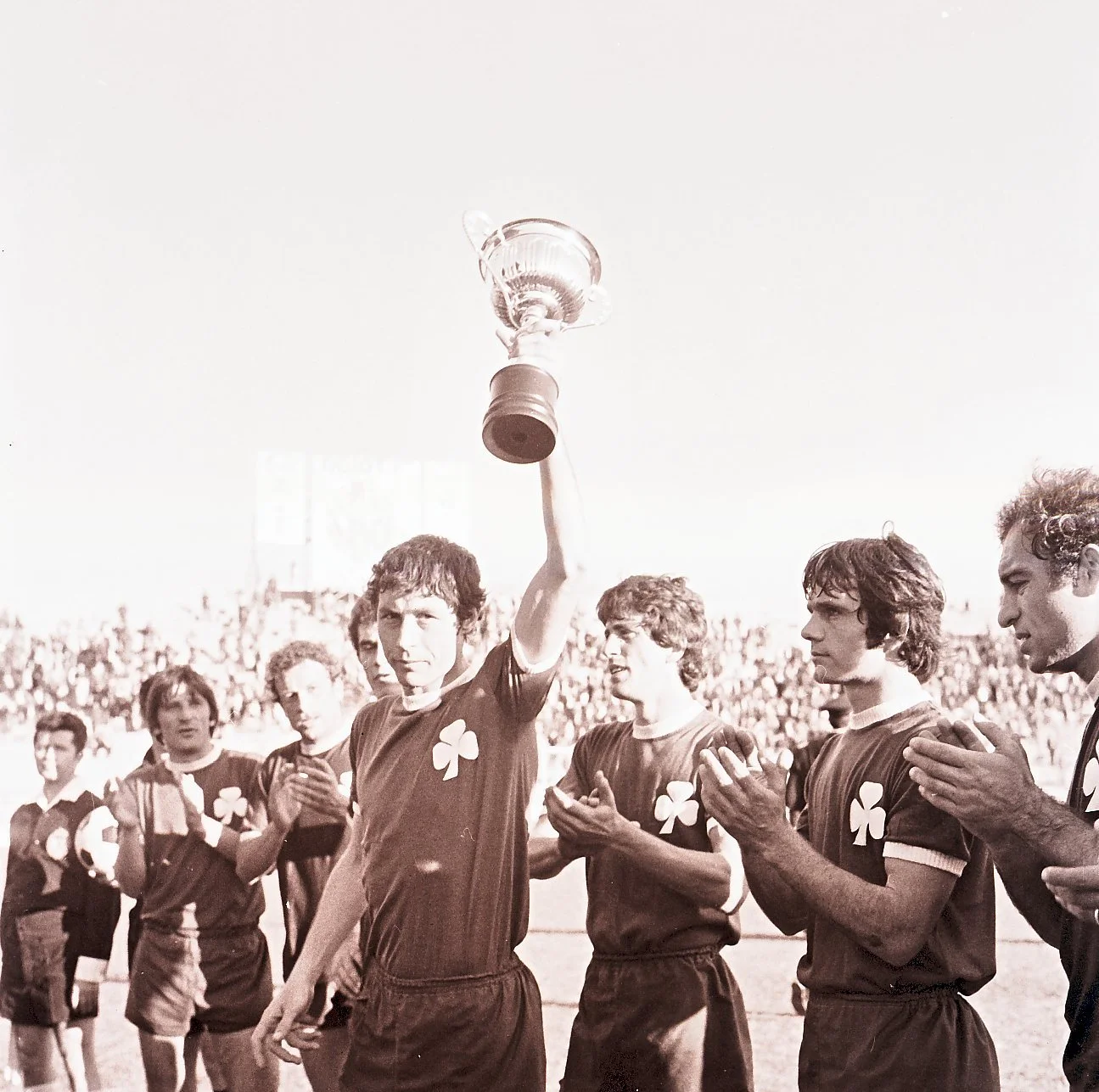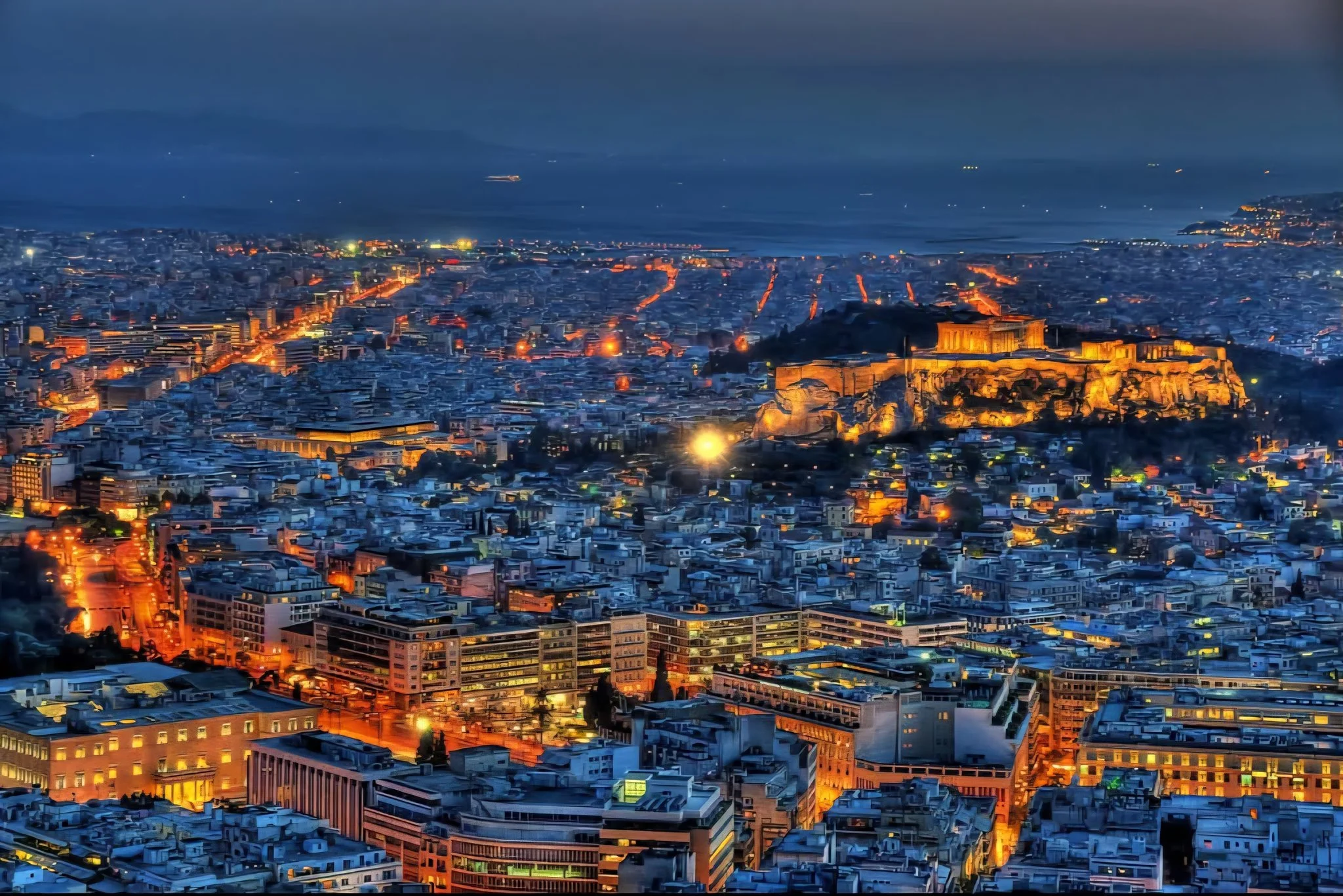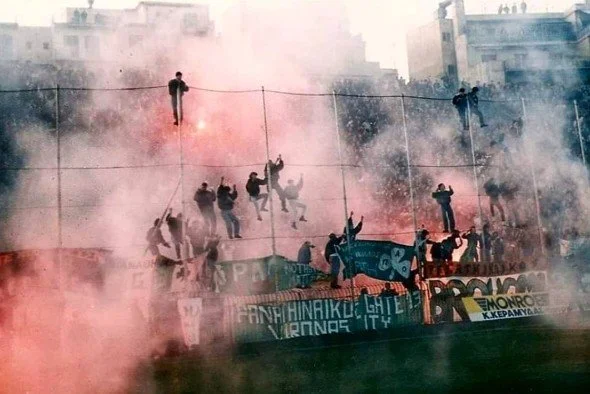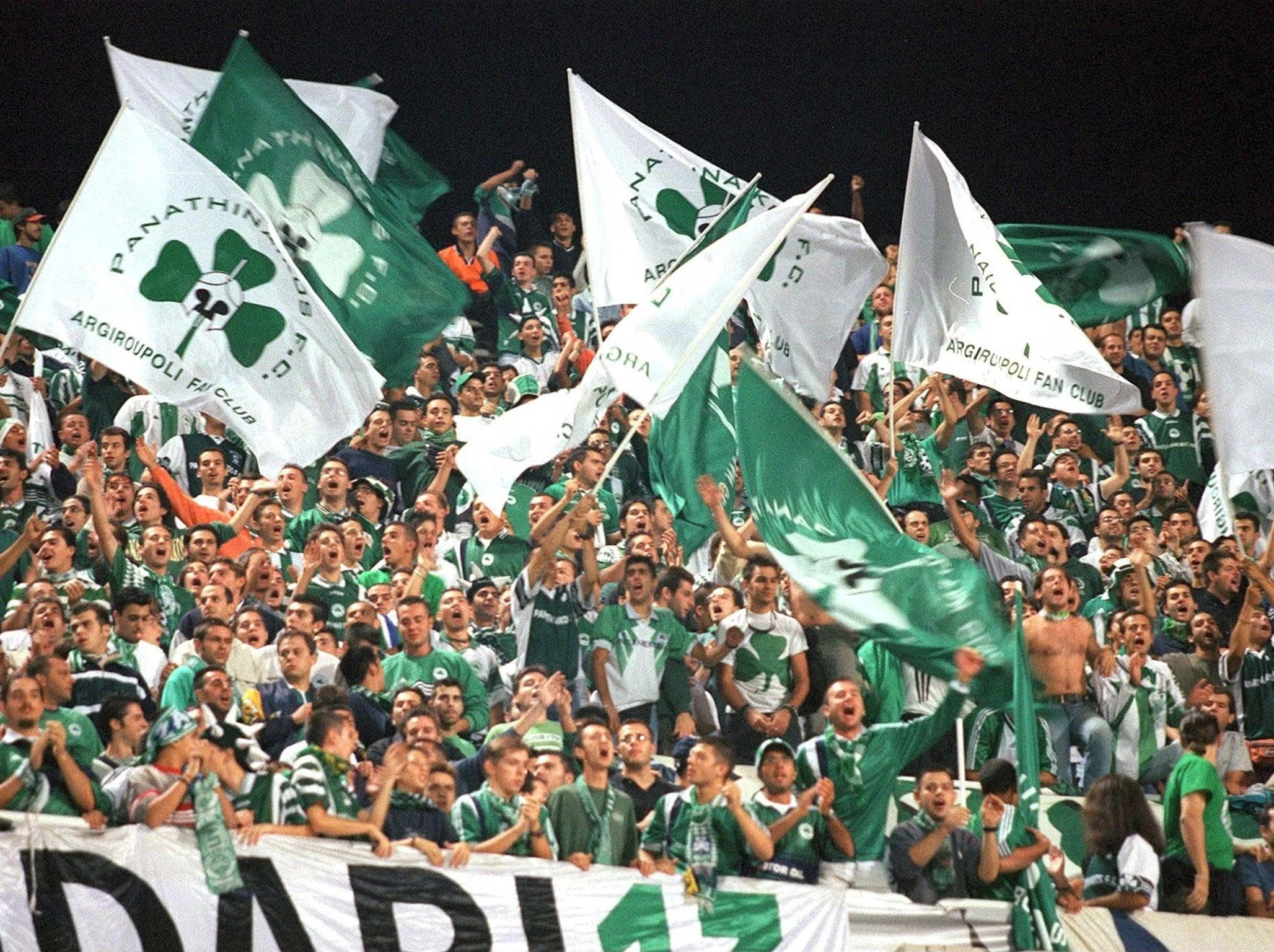
Words by Phil Harrison | Published 18.07.2025The Great Club, there is no other one,
There is no other one that is more energetic,
And thousands of fans, when they see The Shamrock
"Viva!", they say, "Panathinaikos!"
Syllogos Megalos (The Great Club) – Hymn of Panathinaikos (Lyrics by Georgios Oikonomidis: Music by Giorgos Muzakis)
From the knee-jerk heights of Lykavittos Hill, sweet aromas of pine and parched soil spiral skyward from the dense constellation of saplings and fully realised woodland set in dry earth at its base. Pungent trails of smoke, souvlaki and slow-charred croaker diffuse from pot-bellied terracotta firepits serving the neighbouring bistros. Through cracks in the heavy, velvet, burgundy drapes that hang above the doorways of the local tavernas, the dark, melodic death cry of rebetiko – the ethnic folk music of Greece - spikes the hackles of virgin listeners.
Captured in the city’s heady, sensory, sunsetting haze - a miasma that is, to its core, Athens - casting a sweeping gaze across the white-grey, jagged concrete sprawls of the city - relentless, serpentine, alight; the ancient and the modern raggedly adjoined - it is within the auditoria of one’s own imagination to invest in the notion that you are actually walking on terrain once trodden by the Gods.
The city, from this elevated vantage, looks wonderful by night, plumes of electric light rising from the deep basin of Attica pouring ascending prisms of bright colour into the smoke, salt and petrol-scented sky.
I had walked the same path I am walking at this present moment, for the first time, many years ago; September 1992 for the purposes of exactness. A younger man then, my mind was addled after imbibing a fatal triumvirate of Mythos, ouzo and Greek cognac. I rested my elbows on the metal railings embedded in the low, limestone barrier walls, trying to find some kind of respite from my drunkenness. British tourists, eh? They’re always the same; bloody philistines!
With a Karelia lung dart clamped firmly between my pursed lips, the smells, sounds and sights of the city were all around me, challenging my drunken state. I was drawn back to reality by the refrains of a song I now know to be Frangosiriani by the patriarch of the rebetiko genre, Markos Vamvakaris; Markos to locals, decanting from some unknown, velvet-curtained taverna in the near distance. Senses arrested; I peered out into the deep, low grooves of the lamplit metropolis.
‘Mía foúntosi mia flóga écho mésa stin kardiá’ – ‘I have a kindling, a flame in my heart’
Aside from the tormented exhortations of a chanteuse seemingly in the throes of some pressing, existential crisis, I could hear another clamor rising from the distended guts of the urban tangle below; a near silent rumble of thunder rolling in from the eastern falls of Ambelokipi. As minutes passed, what began as an almost inaudible hum thickened to an intemperate growl. What was that sound?
‘Eínai san na me ékanes xórki …’ – ‘It’s as if you have cast a spell on me …’
A young woman, probably in her early-twenties, from whom I’d previously bought a return-ticket so I could ride the Funicular earlier that afternoon, passed by, on her way back home after another mundane shift had ended. She wore jade green overalls and purple Dr. Marten’s boots, her dark, thick brown hair juxtaposing a thin, pale, interesting face; big, mascaraed eyes framed by black, horn-rimmed glasses. On the golden badge pinned to the left breast pocket of her overalls was written the name ΕΛΕΝΗ.
‘Hello. Excuse me’,’ I queried, thrusting a digit in the direction of the indeterminate turbulence afar. ‘What’s happening over there?’
Eleni glanced over the brow of the wall towards Ambelokipi.
‘That’s the fans on their way home from the Olympic Stadium. They always end up back on Alexandras Avenue after the game. And they’re happy tonight. They won 4-0’.
I told Eleni that I wanted to go where the fans were, and, generously, she led me down the vast hill to the midpoint of the furor – ‘I’m going near there anyway. I live in Gyzi’.
Alexandras Avenue was awash with green; a verdant tide of humanity set against the grey granite colour palate of downtown. I offered to buy Eleni a drink, to which she replied, ‘You’ve already had too many drinks’, before politely excusing herself of my company and heading off home.
Alone, I swayed from taverna to taverna - scarves, posters and memorabilia paying homage to Syllogos Megalos (The Great Club) dressing every wall – standing, as inconspicuously as I could; this pale, white boy from middle-England, amid the green-uniformed disciples who vigilantly oversaw this quarter of the ancient city. Jovial, animated fans drank cold, bottled beer and talked; lit with enthusiasm, about their team’s comfortable UEFA Cup victory against Romanian opposition.
In my final pit stop of the night, I caught late highlights of the evening’s functional win on Greek TV; commentary uttered at breakneck speed in a language alien to my own that spewed forth from a monochrome television set overhanging the bar, each goal - Dimitris Saravakos! Krzysztof Warzycha! Christos Kalantzis! Kostas Frantzeskos! – re-celebrated with voracious enjoyment by green-shirted podosfairófiloi who’d already witnessed them scored in the flesh hours earlier from their various alcoves scattered amid the capacious, quarter-full terraces of the Olympic Stadium.
As the tavernas eventually cleared - the tsunami of bodies slowly discharging from shuttered bar frontages (under considerable duress from the bar owners), retreating to their concrete domiciles in Ambelokipi and beyond - I stumbled the short distance back to my hotel in Kolonaki, stopping at a late shop on-route that sold badges and scarves. I bought a Panathinaikos badge and scarf, written in the Greek way - ΠΑΕ ΠΑΝΑΘΗΝΑΪΚΟΣ Α.Ο. – immediately pinning the insignia to my shirt and wrapping the scarf around my neck.
As I inched down the steep, mosaiced walkways towards my hotel and subsequent bed, dead on my feet, two young men of a similar age to my own, bedecked in green, sped by on a splutteringly ramshackle moped: its exhaust pipe hacking out thick reams of black-grey fumes. In their passing they waved, roaring an impassioned chorus of, ‘Ólon ton gávron oi mánes, Eínai p’ytánes, Ólon ton gávron oi mánes...’ I discovered what this curt arrangement of words meant many years later, decoded for me by a Prasini fan I befriended at drama school – and I will refrain from repeating their meaning here. But on the narrow pavements of this nondescript Athens drómos, late September back in ’92 (Oh, what a night!): drunk on spirits and occasion, choked by moped smoke and tinnitused by its ear-splitting, machine-gun reverb, something had changed in me.
This is where it all began.
Panathinaikos squad photo, 1930.
Photo Credit: Sifis VotzakisThe Balkans Cup winning Panathinaikos team of 1977.
Photo Credit: Panathinaikos FCThe beautiful city of Athens from above.
Photo Credit: Phil HarrisonOld school Panathinaikos fans, 1990s.
Photo Credit: Passionate Supporter

